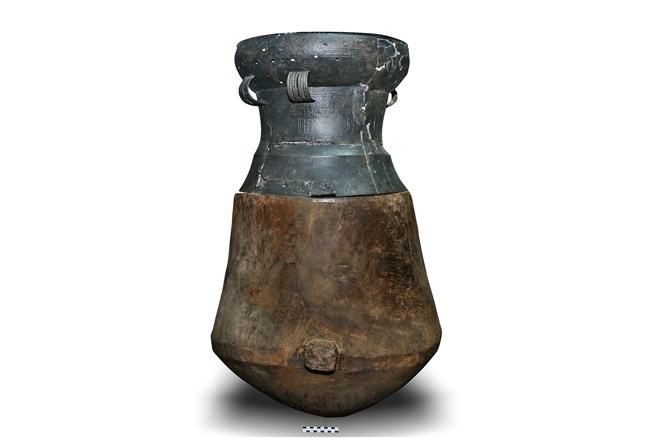
A wooden burial jar with bronze drum discovered in Phu Chanh commune in the southern province of Binh Duong has been recognised as a national treasure by Prime Minister Nguyen Xuan Phuc.
The wooden burial jar with
bronze drum was discovered in Phu Chanh commune of Binh Duong province (Photo:
VNA)
The object was uncovered in
late 1998 by Nguyen Van Cuong residing in Vinh Tan commune on a paddy field in
Phu Chanh commune, Tan Uyen town, at a depth of around 1.8-2.5m.
The wooden burial jar is about 61cm high with its mouth at a diameter of
46-50cm.
The bronze drum is close to 40cm high with a drumhead diameter of 47.5cm and
base diameter of 44cm.
The concentric drumhead has a 10-point star and it is simply decorated with
inverted "v” shaped patterns.
Do Thi Tien, Deputy Director of the Binh Duong Museum, said the artifact is
dated to the second and the first century BC (nearly 2,000 years ago).
This is a new type of tomb, the first to be discovered in the archaeological
history of Vietnam and the world, she added.
The use of a wooden jar with a bronze drum as a coffin is a new piece of
information while studying the lifestyles of ancient resident communities in
the southeastern region, Tien said.
Apart from the wooden burial jar, Binh Duong is preserving another national
treasure namely Doc Chua animal statue which was made around 3,000 years ago in
the shape of a four-legged animal with a long head, and found in Doc Chua
archaeological site.
So far, a total of 164 artifacts have been recognised as national treasures.
Source: VNA
With an increasingly vibrant and widespread emulation movement aimed at building cultured residential areas and cultured families, Yen Thuy District has been making steady progress toward improving both the material and spiritual well-being of its people, while fostering a civilized, prosperous, beautiful, and progressive community.
Once lacking recreational spaces and community facilities, Residential Group 2 in Quynh Lam Ward (Hoa Binh City) has recently received attention for the construction of a new, spacious, and fully equipped cultural house. The project followed the model of state support combined with public contributions in both labor and funding.
The "All people unite to build cultural life" movement, which has been effectively integrated with Kim Boi district’s socio-economic development goals, is fostering a lively spirit of emulation across local residential areas, hamlets, villages, public agencies, and enterprises. In addition, through the initiative, traditional cultural values are being preserved and promoted, while community solidarity and mutual support in poverty reduction and economic development are being strengthened.
A working delegation of the Hoa Binh provincial People’s Committee led by its Permanent Vice Chairman Nguyen Van Toan on June 11 inspected the progress of a project to build the Mo Muong Cultural Heritage Conservation Space linked to tourism services in Hop Phong commune, Cao Phong district.
Born and growing in the heroic land of Muong Dong, Dinh Thi Kieu Dung, a resident in Bo town of Kim Boi district, in her childhood was nurtured by the sweet lullabies of her grandmother and mother. These melodies deeply imprinted on her soul, becoming an inseparable part of her love for her ethnic group's culture. For over 20 years, this love for her hometown has driven Dung to research, collect, and pass down the cultural values of the Muong people to future generations.
In the final days of May, the Ethnic Art Troupe of Hoa Binh Province organized performances to serve the people in remote, mountainous, and particularly disadvantaged areas within the province. These were not just ordinary artistic shows, but they were the meaningful journeys aimed at spreading cultural values, enhancing the spiritual life of the people and contributing to the preservation of ethnic minority cultural identities.



